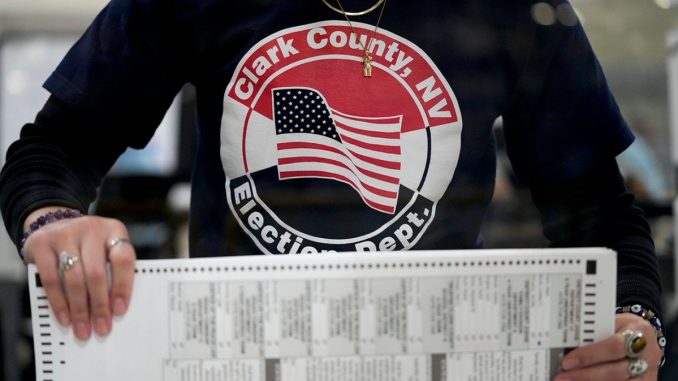
Republican leaders are urging their base to take a less skeptical stance on early and mail-in voting after the party suffered significant losses in the midterms through heavily relying on in-person voting on Election Day.
The GOP’s latest message on the matter marks a change in tone for the party, which was heavily influenced by former President Trump stoking skepticism about early and mail-in voting in 2020. Trump’s message played a role in costing Republicans the Senate in Georgia in 2020 and also impacted their Senate loss in the state two years later.
However, the party will have work to do to convince its base to accept the voting practices. According to a study from Pew Research conducted last year, 62 percent of Republicans said voters should only be allowed to vote early or absentee if they have a documented reason.
A number of prominent Republicans have spoken out about the party’s pitfalls when it comes to early voting, including Republican National Committee Chairwoman Ronna McDaniel.
“While the RNC invested millions of dollars in trying to persuade voters to vote early, our ecosystem must expand our voter turnout window, change the narrative on early voting, and examine the impact of absentee ballot and early vote chasing in states like Florida and North Carolina, as well as ballot harvesting in California, as a model for the rest of the country,” McDaniel wrote in a Fox News op-ed earlier this month.
Republicans have pointed to their losses in Pennsylvania, Arizona, Georgia and Nevada, the four most competitive Senate races of the cycle, as evidence that they need to revamp their early vote strategy.
Georgia saw record early vote numbers in its Senate runoff earlier this month. According to state elections data, more than 1.8 million voted early in person or absentee.
Republican strategist Ford O’Connell called for Republicans to embrace an “urban election strategy,” in an effort to appeal to voters in metropolitan areas that often make up the majority of a state’s population. Pennsylvania, Arizona, Georgia and Nevada are all home to population centers that Democrats heavily targeted this past election cycle.
“We have to start fighting and playing the game the way Democrats do,” O’Connell said in an interview with The Hill. “The Republicans are going to be hard-pressed to win the White House in 2024 if they don’t pick up Georgia and Arizona.”
“In a lot of ways, someone could argue that Georgia and Arizona for Republicans are the new Florida and Ohio,” he added, referencing the states’ must-win status.
In her Fox News op-ed, McDaniel argued that an early vote strategy stands to benefit Republicans with turnout in rural areas as well.
“Our party must also address the lack of early vote days for rural Americans and work to ensure that we are adequately chasing ballots, whether early, by mail, or on election day,” McDaniel wrote.
But this likely won’t be an easy task for the party, given GOP voters’ skepticism over the process that was exacerbated by Trump — who has voted by mail himself — over the 2020 elections.
“It is going to take time and some hard lessons until we get back to where we were,” said Brian Seitchik, an Arizona-based GOP strategist and Trump campaign alum. “I don’t think there’s a secret sauce of messaging on this. I think we’re just going to have to do this the old-fashioned way, and that’s door-to-door.”
Republicans acknowledge that the effort to get their base to trust early and absentee voting again will likely take multiple election cycles.
“It starts with a structure and the RNC and state parties realizing that they have to do better with this, and that is happening,” said former RNC spokesman Doug Heye. “Now that has to happen in 50 states; it can’t just happen in three.”
However, there are still efforts in Arizona in which GOP figures, including Republican gubernatorial candidate Kari Lake, are challenging the election results, citing allegations like the claim that many mail ballots with mismatched signatures were tabulated anyway.
“That’s the problem and that’s why it takes 50 states,” Heye said. “If Arizona continues down this road, well, that affects potential Senate races, as it did this time, and House races and gubernatorial candidates.”
“That has an impact on that state and that has an impact nationally, “ he added.
Other Republicans argued that a greater reliance on early voting would ease stresses about potential Election Day issues, including tabulator malfunctions.
“If you bank votes early, you don’t have to worry about tabulator malfunctions and people waiting in long lines on Election Day,” O’Connell said. “There are a lot of ways that we can gripe about the rules but the fact of the matter is until the rules are changed, these are the rules we have.”
Via The Hill
